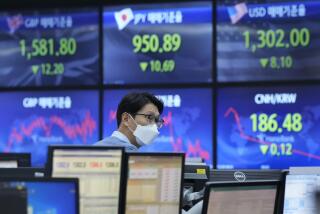Japan Central Bank Reportedly to End Zero Interest Rates
- Share via
TOKYO — Japan’s central bank is expected to reverse its zero-interest-rate policy today, bringing to an end one of the more unusual experiments in modern economic history.
Citing sources, Japan’s influential Nihon Keizei Newspaper said the Bank of Japan will lift a key overnight interest rate to 0.25% from zero at its meeting today.
The vote follows months of debate and hand-wringing over the issue.
“Rarely has there been so much talk about 25 basis points,” said Jeffrey Young, chief economist with Nikko Salomon Smith Barney.
Despite the small headline number, however, the economic and political stakes are substantial.
BOJ Gov. Masaru Hayami has put his credibility and perhaps his job on the line in his very public push to end the zero-rate policy. The change is needed, he said, because Japan’s economy is out of danger and no longer needs such drastic medicine. Higher rates also would speed up restructuring among weak and inefficient Japanese companies, he added.
As his stance has hardened, the policy also has become something of a test of the independence of Japan’s central bank. “In the end, for the BOJ, saving face has become the issue,” said Yasunari Ueno, chief economist with Fuji Securities. “A lot of organizational egos have been exposed.”
On the other side of the debate are most of Japan’s ministries and politicians, who say an increase would only hurt their constituents--Japan’s debt-laden banks and companies.
In fact, if the BOJ goes ahead as expected today, higher rates could burden an economy struggling to find its footing, several private economists said.
They also could strengthen the value of the yen against the dollar and hurt the competitiveness of Japanese exporters.
Economists see several potential problems stemming from a rate increase. “I think it’s a lose-lose situation,” said Chris Calderwood, chief economist with Jardine Fleming Securities. “It appears the BOJ has a maniacal death wish.”
Many companies would be hurt because they would have to pay higher interest on their loans, possibly pushing the companies over the edge. Net corporate debt in Japan subject to interest payments is estimated at $8.4 trillion.
Higher rates also could undercut already weak profits at companies and banks. Morgan Stanley Japan chief economist Robert Feldman estimates that over 18 months, the increase could reduce earnings by up to 20%.
The move also could push up the yen’s value, making Japanese-made Walkmans, for instance, more expensive and less competitive at the local Wal-Mart, all else being equal.
One winner could be consumers receiving higher interest on their savings accounts, although in most cases it would mean only a few more cents annually. “I really don’t see much impact on my own life,” said Shigeyuki Fujiwara, a 45-year-old marketing executive.
Economists agree that Japanese restructuring has been painfully slow but say accelerating this isn’t the BOJ’s concern. “This is a very dangerous argument,” said Nikko Salomon Smith Barney economist Young. “That’s not what monetary policy is about.”
For one thing, Japanese politicians have already signaled that they will consider more subsidies for troubled small companies to compensate for the higher interest rates.
Not only would this undermine BOJ efforts to speed up restructuring, it could lead to another round of government stimulus spending when Japan’s government debt is already at 130% of gross domestic product and growing. The debt level is Japan’s biggest medium- to long-term problem, most agree.
Economists stress, however, that many of the dangers resulting from higher rates are not huge. The small size of the increase, improved business confidence, signs of recent economic improvement and the fact that many markets have anticipated the change all suggest the system can weather the added burden. It’s just that it doesn’t help anything, and could hurt Japan, they add.
Deregulation accompanied by continued ultra-loose monetary policy to help companies weather the rough patch is a better approach, some argue.
Most economists agree, meanwhile, that the zero-rate policy has been very successful. Only rarely in recent history has such a policy been enacted for such an extensive period. Switzerland in 1979 set a zero-rate policy but only for a short period on foreign deposits.
Economists say that, in Japan’s case, it has done several things since it was enacted in February 1999: It helped check what some feared would be a meltdown in Japanese bond markets. It arguably helped--along with the recapitalization of the financial system--restore consumer and business confidence. It helped pick up the depressed stock market at the time. And it helped stabilize the currency.
*
Hisako Ueno in the Tokyo bureau contributed to this report.
More to Read
Sign up for Essential California
The most important California stories and recommendations in your inbox every morning.
You may occasionally receive promotional content from the Los Angeles Times.













